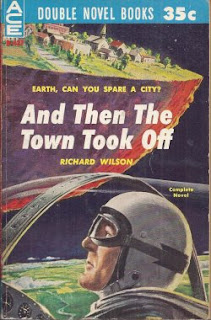Sometimes when I read a science fiction novel I think about what Kurt Vonnegut said: “Science fiction is the urinal of literature.”
That's the vibe I got about half-way through AND THEN THE TOWN TOOK OFF by RICHARD WILSON. It was issued as one-side of an Ace Double in 1960. Back then a writer could submit a manuscript that was little more than farcical drivel, get it published, earn a few hundred dollars and gain traction in the writing business.
Richard Wilson did – gain some traction, that is -- he later won one of science fiction’s highest honors, The Nebula Award. He also was nominated for the supreme SF honor, the Hugo.
I bet he didn't get many accolades for this yarn even though it has an intriguing premise: A small town of 3,000 people in Ohio suddenly finds itself uprooted from the earth and levitating high into the earth’s atmosphere.
Yet, this is far from an original idea at the time. James Blish had already published at least two of his “Cities in Flight” novels by the late 1950s, and Wilson seems to have merely commandeered the same idea and played his version for laughs, whereas Blish’s books were hard science fiction – and with a lot of technical scientific speculation to boot.
I’ve already hinted at the major problem with And Then The Town Took Off – there’s a premise, but little in the way of plot. Rather, the novel plays out as a series of zany reactions by the resident of Superior, Ohio, to their extraordinary situation. When it finally comes time to explain how the town was levitated, we don’t even get treated to the thrill of the characters taking action to solve their own mystery. The 'Big Reveal' about why everything is happening is not clever either.
Instead, Wilson resorts to “magical explanations” thinly disguised as elements of science fiction, as in: The aliens did it. They can perform any miracle they want with super advanced science. Wilson and his editors felt no need to make it plausible. Furthermore, the aliens are meddling with earth’s cities for a reason that was already a hackneyed plot device by 1960 – their own planet was destroyed by a nova so they had to going roaming the stars to find a new home.
One positive aspect of the novel is Wilson’s talent at creating vivid, likable characters – something so many writers of today seem to have forgotten. For example, here is how Wilson introduces us to one of two potential love interests he supplies for his main character, Don Cort. He he first encounters her on a passenger train:
“The girl’s hair was a subtle red, but false. When Don had entered the club car he’d seen her hatless head from above and noticed that the hair along the part was dark. Her eyes had been on a book and Don had the opportunity for a brief study of her face. The cheeks were full and untouched by make-up. There were lines at the corners of her mouth which indicated a tendency to arrange her expression into disapproval. The lips were full, like the cheeks, but it was obvious that scarlet lipstick had contrived a mouth a trifle bigger than the one nature had given her.”
That’s pretty good – as is her name – Geneva “Jen” Jarvis.
Since this book is free – and short – I still say it is worth a read, if only for the delightful characters. Also, it gave me that certain happy nostalgic feeling for a simpler time when America was more uniformally prosperous and less complicated -- back when a hack writer could sit down at a battered typewriter, clack out a one-draft space opera and sell it to a decent publisher.
Ken Korczak is the author of: MINNESOTA PARANORMALA

No comments:
Post a Comment